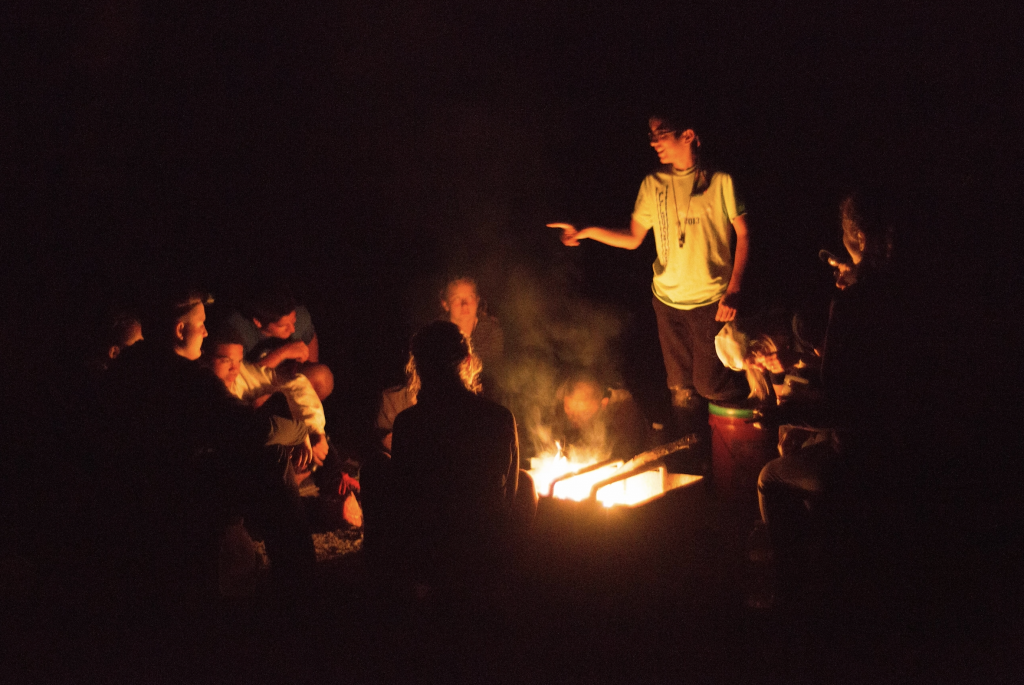“I have a daughter,” my 15-year-old student said to his peers around the campfire on the second night of our 20-day canoeing course.

Photo by Ryan Harris
My co-Instructors and I looked around the circle at each other, at the other students, and the recently self-proclaimed father, waiting to see how this conversation would unfold.
When his peers asked clarifying questions, he explained he misspoke and his daughter hadn’t been born yet, but his girlfriend was pregnant.
My instructional team was dumbfounded because that information wasn’t disclosed to us by him or his mother who had dropped him off before the start of our course, despite us asking if there was anything going on at home that we should know about.
Over the next few days, our crew got its first resupply of materials, including letters from loved ones at home. Interestingly, our fireside storyteller was full of surprises—he got a letter stating that his pregnant girlfriend had gotten into a car accident. The strangest part of the letter was it was written on the same type of paper he had in his own notebook, and it was written in pencil—the only writing utensil he had for himself. Plus, the handwriting looked oddly familiar.
After some investigating, the student’s mom confirmed that he didn’t have a baby on the way, he didn’t have a girlfriend, and no one they knew had been involved in a car accident.
So why did he lie?
The Four Basic Needs
There’s a premise in psychology that everything a person does comes from an effort to meet their needs. Once a person is physically safe—meaning they’re fed, their thirst is quenched and they’re away from imminent harm—they can expand their needs to include happiness. This comes in the form of freedom, power, fun, love and belonging.
If everything a person does is a choice, and every choice is made to meet some basic need, then every time a person chooses to lie, it’s to meet one of their four basic needs.
Often, when teens lie to their peers, they’re seeking social status or acceptance. In other words, they’re trying to meet their need for power or their need for love and belonging. Sometimes teens lie to stir the pot. In this case, they may be trying to meet their need for fun. And sometimes teens lie to try to get out of something. They’re seeking freedom.
When a teen lies and someone asks them what need they were trying to meet, it gives them an opportunity to analyze why they made the choice to lie. Once they’ve reflected, they can benefit even further from being asked to come up with a more constructive way to meet that need in the future.

The Stages of Change
Try as we might to change people, we can’t. I can only control myself. You can only control yourself. We can point out to another person that we’ve noticed a particular behavior from them repeatedly. But only they can actually change their ways.
A common model in studying the psychology associated with change is called the Stages of Change model, which states there are different stages in the cycle of changing one’s typical behavior.
The first stage is pre-contemplative. The person is unaware they exhibit a behavior that, if changed, could benefit them and others. For example, my student with the fake story about his baby may have not even been aware of the impact his fictional stories had on his relationships.
The second stage is contemplative, which means the person is conscious of their behavior and its consequences but isn’t (yet) thinking in terms of changing the behavior. For example, maybe the young man I described earlier was contemplative and realized he was breaking trust with each lie he told, but wasn’t quite ready to stop lying because he didn’t know how better to meet his need for love and belonging.
The third stage is determined, meaning the person has identified the behavior and wants to change it but doesn’t yet have a plan in place to ensure change happens. Thinking back to the original fibber, he may have recognized his typical behavior was to lie and decided that its negative consequences outweigh the positive, and determined to change. Maybe he vocalized this realization to someone he trusts, like his mom.
The fourth stage is action. Thinking becomes doing. This is where the non-dad mentioned above is aware of his lying habit and wants to change his ways. He makes a plan to lie less and decides today is the first day in a long time he won’t lie, and then he follows through and doesn’t lie all day.
The fifth stage is maintenance. At this point, a person is going strong with the changes they’ve made. In our example, it would mean the teen hadn’t told a lie consistently for a while.
And a bonus stage is relapse, which can occur at any stage in the cycle. It means that a person has fallen into their old habits and will have to work their way toward change once again.
Whichever stage of change my student was on, his choices to repeatedly lie caused the people around him to lose trust in him. I couldn’t force the young man to be honest. Only he could decide to change and be truthful. But what I could do was talk to him and try to decipher what stage of change he was on so that I could then subtly and slowly guide him through the stages.

It can be really frustrating to interact with a teen who lies. It can be especially difficult if that teen is someone you love and care about. Remember that those lies are being told in an attempt to meet a basic need—love and belonging, power, freedom, and fun.
Help the teen you love meet those needs in a more positive way. And support that teen as they, at their own pace, move along the Stages of Change.
About the Author
Elizabeth Bowling is a field Instructor for the North Carolina Outward Bound School. She is based at the Scottsmoor, Florida basecamp and primarily instructs flat-water canoeing courses for at-risk youth which focus on behavior management. Elizabeth has a degree in journalism and international studies from the University of Connecticut.




